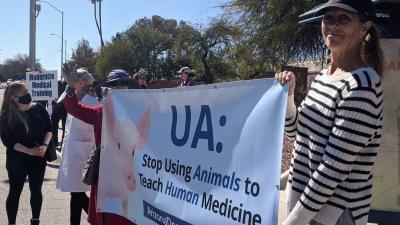Physicians From Across the Country Call on St. Elizabeth Hospital, NEOMED to End Deadly Surgery Training Using Animals

YOUNGSTOWN, Ohio—Physicians from across the country, organized by the Physicians Committee for Responsible Medicine, are urging St. Elizabeth Youngstown Hospital to replace live animals in its general surgery residency program with modern, human-relevant methods. Hospital faculty currently teach invasive procedures on live pigs at Northeast Ohio Medical University in Rootstown. In a letter sent today to St. Elizabeth and NEOMED leaders, 646 physicians point out that nearly 80% of surgery residencies in the U.S. and Canada have moved away from this practice and now use devices modeled on human anatomy.
"The use of live animals in surgery training is outdated and unnecessary," said Eric Singer, MD, an emergency medicine physician from Akron. "St. Elizabeth shouldn’t require surgeons to translate pig anatomy to human patients.”
According to public records obtained by the Physicians Committee, surgery residents practice more than 30 procedures on live pigs, including making incisions into the animals’ necks, chests, and abdomens to insert surgical tools and to remove the spleen, kidneys, and gallbladder. Any surviving animals are killed after the training sessions.
However, scientific studies have shown that nonanimal methods—such as human-patient simulators and cadavers—are equally or more effective for teaching surgical skills. A 2020 U.S. military study found that trainees using advanced surgical simulators showed significant improvements in both response times and reduced medical errors. Additionally, research has demonstrated that simulators and human cadavers offer comparable or superior results to animal-based training in building surgical competence, boosting confidence, and preparing residents for high-stress environments.
The Physicians Committee notes that 78% of surveyed general surgery residencies in the U.S. and Canada (223 of 286) have replaced animals in favor of nonanimal methods. Stanford University, Yale University, and the Mayo Clinic rely solely on human-relevant training methods to train surgeons. In Ohio, 13 other surgery programs, including the Cleveland Clinic’s, train without animals.
"Human-relevant training methods are more effective in preparing residents for real-world situations," said John Pippin, MD, FACC, director of academic affairs for the Physicians Committee. "They allow for repeated practice on realistic human anatomy, which supports deeper and more relevant learning.”
To see the letter or to interview Drs. Singer or Pippin, please contact Reina Pohl at 202-527-7326 or rpohl [at] pcrm.org (rpohl[at]pcrm[dot]org).
Media Contact
Reina Pohl, MPH
202-527-7326
rpohl[at]pcrm.org
Founded in 1985, the Physicians Committee for Responsible Medicine is a nonprofit organization that promotes preventive medicine, conducts clinical research, and encourages higher standards for ethics and effectiveness in education and research.








